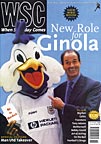 Revolutionary times at Fir Park, where the board has been cutting prices and attracting bigger crowds. David Innes reports on their crazy, madcap schemes
Revolutionary times at Fir Park, where the board has been cutting prices and attracting bigger crowds. David Innes reports on their crazy, madcap schemes
Motherwell FC are not a very fashionable side. We have the dubious honour of having lost more Premier League games than any other team, due to the fact that we have avoided relegation narrowly in the majority of seasons since we were promoted in 1985.
In the mid-1980s, the club was in very real danger of becoming the first since Third Lanark to go out of business, the saving grace being reconstruction of the Premier League and the subsequently reduced opportunities for relegation. The prudence of chairman John Chapman and the managerial acumen of Tommy McLean steadily turned the club round, culminating in 1991 with the capture of the Scottish Cup for the first time in 39 years. Before McLean left, he built a team that was to finish third and then second in subsequent seasons, qualifying for Europe on both occasions. The team went into serious decline thereafter under the inept stewardship of McLean’s successor, Alex McLeish, and it was clear that action was required.
In August, successful local businessman John Boyle, who had recently sold his Direct Holidays company to Airtours for £45 million, paid around £2.5 million for control of the club. From the outset, it has been clear that Boyle’s approach is different to that of most of the millionaire chairmen we have become familiar with in the 1990s. In his first statement he said he would never pour a significant amount of his personal wealth into the club à la Jack Walker, but instead would attempt to raise finance through various initiatives.
The main focus of Boyle’s early endeavours has been to significantly raise the average attendance, which has been in decline throughout the decade. Motherwell suffer more from the huge pulling power of the Old Firm than any team in the Premier League. Boyle’s view was that as Motherwell is located in the most densely populated area of Scotland, there should be plenty of scope to attract new fans rather than trying to steal them back from Rangers and Celtic.
Prices were cut to £5 for adults and £1 for kids, and Boyle was instantly rewarded with near-capacity crowds for games against Dunfermline and Dundee United. The fact that the latter was live on Sky at 6pm on a Sunday makes it all the more remarkable. It also raises questions about why people don’t go to more games. It seems plausible that it is cost and not the quality of football that is the major factor in the size of the gate.
Such initiatives have raised the profile of the club and stimulated discussion about pricing , with Dundee, St Johnstone and Kilmarnock all cutting prices in recent games. It is conceivable that there could soon be a two-tiered price structure in the Premier League, with Rangers, Celtic and a few others charging £15-plus and the rest around half that. It may be over-simplification, but surely it is better to have 12,000 supporters at £7 than 5,000 at £13.
The only people at Fir Park who were grumbling about the price cuts were the season ticket holders, that was until a letter from Boyle arrived to say they would get the same amount off their next season ticket, plus a 15 per cent “loyalty bonus”. This was particularly pleasing because the loyalty of season ticket holders is often taken for granted as clubs try to entice less frequent attendees.
Boyle has also changed the structure of the club, with the appointment of Pat Nevin as chief executive. The fact that Nevin is also registered as a player and so is technically manager Harri Kampman’s boss has generated reams of press coverage, mostly negative. It has been virtually ignored that as well as having business administration qualifications, Nevin also had a successful spell as chairman of the English PFA, which gave him an excellent knowledge of contractual matters.
Motherwell seem to get negative press most of the time, but it has been particularly evident this season. I don’t think it is paranoia, but I’m fairly sure that a Motherwell relegation would probably be greeted with quiet satisfaction from the Scottish tabloids. In trying to raise their profile and to challenge the accepted norm in the way that a Scottish football club is run, Motherwell seem to be perceived as upsetting the apple cart – we are seen as a small club and many people would prefer it if we stayed that way.
Although it is too early to judge the success of the changes that are being made, I for one find it refreshing that, at a time when club owners have had a negative effect on many clubs, John Boyle is actively improving things for ordinary supporters. If things can be similarly improved on the pitch, we might one day even merit a patronising story at the end of Football Focus. Then we will know we have arrived.
From WSC 141 November 1998. What was happening this month